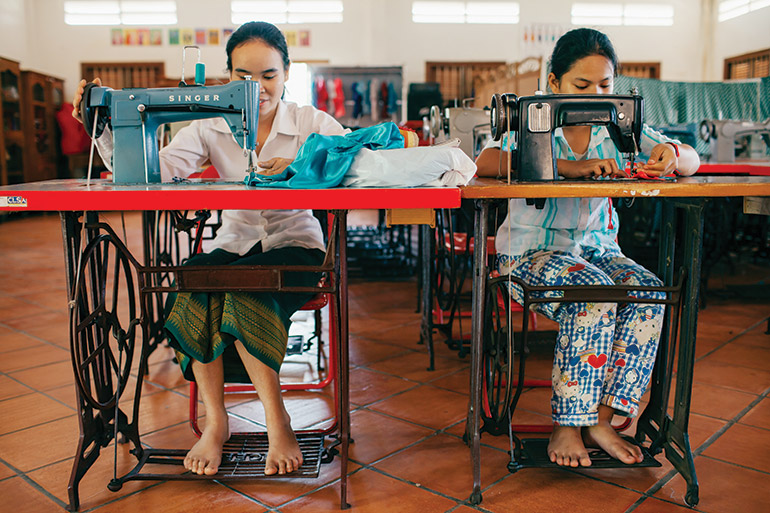The Together1heart Facebook page mixes stories of traumatic rapes endured by young Cambodian women with video messages from celebrities such as Susan Sarandon urging donors to “make the imaginary world that’s free of slavery a reality”, along with images of Somaly Mam surrounded by the girls in her care. It’s the latest iteration of anti-trafficking activist Mam’s fundraising machine, three years on from when her world crumbled at the hands of a May 2014 report in Newsweek.
Mam was the inspiring face of the fight to end human trafficking in Cambodia, a scourge she and her organisations brought to international audiences in a sensational fashion. She raised millions of dollars for anti-trafficking efforts, her cause celebrated at gala dinners around the world. She met with members of royalty, Hillary Clinton and even Pope John Paul II.
All that came to an abrupt halt when Newsweek reported that Mam had falsified her own life story as a sex slave and coached young women to create vivid stories about being trafficked. Mam later strongly denied the allegations, saying her “priority was the girls”.
By the time she started granting interviews, the Somaly Mam Foundation (SMF) – which acted as the fundraising arm for Agir Pour Les Femmes En Situation Precaire (AFESIP), the Cambodian organisation Mam and her then-husband established in 1996 – had already announced her resignation.

Months later, SMF executive director Gina Reiss-Wilchins released a statement announcing the organisation was closing. A financial report filed with the US Internal Revenue Service (IRS) shows that in 2014 the SMF’s total expenses reached $1.865m, including $285,912 for an independent investigation into Mam’s claims by Boston-based law firm Goodwin Procter (the findings were never released publicly) and $108,068 paid to Mercury Public Affairs, described on its website as a “global, high-stakes public strategy firm”.
AFESIP received just $152,923 from the SMF that year, according to a 2015 financial report audited by accounting firm KPMG.
Set adrift by the SMF, Mam quickly launched the New Somaly Mam Fund in December 2014. Although discredited in several quarters, many of her closest backers stuck with her. Rigmor Schneider, the former operations director for the SMF, became executive director, fielding thorny press queries from around the world.
In an email to Southeast Asia Globe last month, Schneider said she was no longer involved with the organisation. “I just helped them to get re-established after the shutdown of the SMF,” she wrote. “My primary goal was to ensure people in the US had a way to help the women and girls in Cambodia.”
US actress AnnaLynne McCord, a former star of teen drama 90210 and a long-time supporter of Mam, said she was asked by the board in November 2015 to take over as president. On 25 June 2016, she hosted an official launch for the organisation, which had been rebranded as Together1heart, in Beverley Hills, California. Several minor celebrities attended, with photographs splashed on gossip sites such as justjared.com.

Neither McCord nor Schneider clarified the reason for the name change, but a report filed with the IRS provides a clue: the New Somaly Mam Fund received just $173,643 in contributions in 2015, with total programme expenses listed at $109,100. Board members – including vice-president Mam, who had previously been criticised over the size of her salary – reported that they did not receive any remuneration.
Together1heart’s 2016 IRS filing is not yet publicly available, but it appears that financial issues continue to plague the organisation in the wake of the 2014 fallout. “We had to temporarily close Kampong Cham and Siem Reap, two of our three centres,” McCord wrote in an email. “We are seeking funds to reopen them due to [the] over-flow of survivors coming through our doors.”
According to McCord, 91 staff members in Cambodia immediately lost their jobs when the SMF closed. “It destroyed livelihoods, but it could not destroy our lives because our girls, the staff and Somaly Mam are survivors. As Somaly consoled me: ‘Sister, we have seen so much worse. We will be OK. We keep fighting. We are survivors,’” she told Southeast Asia Globe in an email.
Sylor Lin, AFESIP’s operations director and former Cambodia director of the SMF, said Mam was unavailable for interview as she was travelling in Myanmar.
While Mam’s name has been disassociated from Together1heart, posts on the organisation’s Facebook page show she remains heavily involved, both spending time at AFESIP’s refuge centre and attending fundraising events abroad.
AFESIP’s 2015 report, the most recent available on its website, shows that its income halved from $727,384 to $385,170 between 2014 and 2015. In 2013, it had peaked at over $1.2m, with more than half of that provided by the SMF. However, the shortfall was exacerbated by a plunge in donations from other sources, with many donors withdrawing funding following the Newsweek allegations.
Among Mam’s critics is Berkeley College professor Heidi Hoefinger, who has spent more than ten years researching the sex industry in Cambodia. She argues that Mam conflates prostitution with trafficking – with troubling results. “For many people involved in the sex trade in Cambodia – either by choice, circumstance, or coercion – Mam’s powerful legacy of stories has not led to protection and freedom, but instead increased suffering and violence,” Hoefinger wrote in a 2016 paper for the Anti Trafficking Review, pointing to evidence that trafficking prohibition efforts often infringe on sexual health rights of female sex workers.

Asked if AFESIP or Together1heart had made any changes to the way they operate as a result of the 2014 media storm, McCord replied: “No. Neither AFESIP, nor t1h [Together1heart] were the problem. The problem was quite simple, actually. We live in a world which sometimes would rather destroy someone doing good than acknowledge just how far we must go to fight the bad. AFESIP/Together1heart stands in solidarity against evil perpetuated onto women and children through sexual exploitation. WE DO NOT BACK DOWN.”
Sebastian Marot, executive director of child welfare NGO Friends International, said it would be “concerning in many ways” if the organisations had not sought to improve. “A crisis, or something you’ve done wrong that you’ve been called out for, is a good time to reflect and try to improve your practices,” he said.
Nevertheless, some changes have occurred: the organisation now blurs out the faces of its young charges in social media posts, while AFESIP’s programme director previously signalled a shift from ‘rescue’ to ‘rehabilitation’ work.
Stephanie Lorenzo is CEO of Australia-based Project Futures, which has supported AFESIP since 2009. She told Southeast Asia Globe that, in her experience, the organisation has worked to evolve in recent years. “AFESIP is not perfect, but their willingness to take advice and improve the work, in my opinion, has been taken on by their staff as best they can under harsh and often unfair circumstances,” Lorenzo said. “We are proud to have stuck by them through a difficult period.”
Hoefinger, however, suggests there is still a long way to go. “Mam and her fellow humanitarians should turn their attention to the structural socio-economic preconditions behind the expansion of the contemporary Cambodian sex industry,” she wrote. “Only then might the rights of sex workers truly be addressed, as well as the needs and desires of women and children involved in ‘real’ cases of exploitation and sexual labour against their will.
Read our full interview with AnnaLynne McCord here.
Additional reporting by Hemmunind Hou


